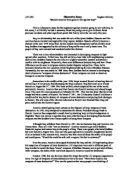There are many truths about Iraq, but to the same effect there are many conjectures. The facts on the situation: The Iraqi regime is a rather tyrannical one; in 1980 they invaded Iran; they used U.S. supplied weapons against Kurdish rebels. The conjectures: They may have chemical weapons; they may be on their way to developing one nuclear weapon.
Let us address the facts. Although Iraq’s leaders – Saddam Hussein in particular – were tyrannical, it is not a justification for the American invasion. The US openly supports countries with similar regimes and ruling structures, for example, Saudi Arabia. Also, Iraq’s attacks on others should not be a reason for war, particularly since the U.S. willingly supplied the Iraqis with the weapons that allowed them to carry out such an invasion.3
Then there are the conjectures: Iraq may have chemical weapons, and they may be developing nuclear weapons. It seems rather hypocritical that a nation like the United States would accuse others of having such weapons when they themselves are quite possibly the world’s most armed nation. Iraq doesn’t even come a close second, yet they are the target of the U.S.’s attention. The American government required Iraq to allow unrestricted U.N. inspection. Through examination of past events, like those in Germany in the late 1940’s, it would be highly unlikely that the U.S. would willingly submit to the same requests they put upon Iraq.
Finally, Iraq was in no way directly related to the terrorist attacks on the United States. The American government took advantage of the support of their people on the issue of terrorism. Because of their fear and insecurity, American citizens blindly supported the attack on Iraq even though it had nothing to do with terrorism. The 9/11 attacks were orchestrated by Osama bin Laden and al-Qa’ida, not by Saddam Hussein. The U.S. wished to gain control over valuable Iraqi oil reserves1. They used Hussein’s evil ways of governing and failure to allow what appeared to be pointless UN inspections as excuses for invasion, even though nothing Iraq was doing was directly affecting the United States of America. A poll conducted by Retro Poll showed that 53% of Americans were unaware that Iraq was not directly connected to the 9/11 attacks. On the day of the World Trade Center attacks, President Bush urged General Clark to link Baghdad to the terror attacks, but Clark declined to do so because of a lack of evidence.
Though the U.S. invasion in Iraq proved to the world that the Americans are a force to be reckoned with, it accomplished no direct successes with regards to the September 11 attacks. The Americans has a history of supporting Iraq in their military efforts, and invaded Iraq without, in my opinion, just cause. Iraq was not involved in the terrorist attacks, and the U.S. was not completely justified in their actions. Had they waited to gain additional world support and built a stronger case for an invasion, it would have justified military movement. If however, George Bush wished to eliminate terrorism, his efforts would have been better focused in Afghanistan, the home of those responsible for the tragedy on September 11, 2001.
Other Noteworthy Sources:
“Hussein, Saddam”, Biography.com ©1996-2003, A&E Television Networks 7 Dec 2003 <http://www.biography.com/search/article.isp?aid=9347918&search=Saddam+Hussein>
“Top Ten Reasons Why the US Should Not Invade Iraq”, GlobalExchange.org ©2003-2017, Global Exchange 7 Dec 2003
<http://www.globalexchange.org/countries/iraq/invadeIraq082702.html>
Iraq: A Focus Misdirected
Vanessa Versteeg
December 16, 2003
Mr. R. Brine
Global History 12
“Iraq Timeline” InfoPlease.com ©2003 Family Education Network 7 Dec 2003 <http://www.infoplease.com/spot/iraqtimeline1.htm>
“Arming Iraq: A Chronology of U.S. Involvement” Infowars.com ©2002-2003 Alex Jones, All Rights reserved 7 Dec 2003 <http://www.infowars.com/print/iraq/arming_iraq.htm>
“The Case Against War on Iraq” CommonDreams.org ©2002 Globe Newspaper Company 7 Dec 2003 <http://www.commondreams.org/views02/0819-01.htm>
“The Berlin Blockade” Viewpoints, Susan Aliphat et al. ©1993 Prentice Hall Canada Inc., Scarborough, Ontario 7 Dec 2003
“Public Growing Tired of Being Misled on Facts in Iraq” RetroPoll.org 8 Dec 2003 <http://www.retropoll.org/press_release_poll03.htm>
“FAIR Notes Clark’s Admission of Bush Lies Starting on 9-11” RetroPoll.org 8 Dec 2003 <http://www.retropoll.org/from_news.htm#bushlines>







